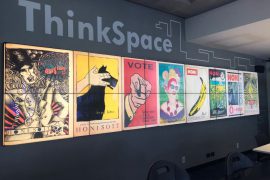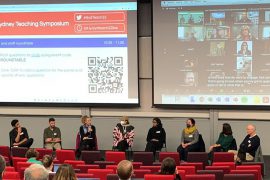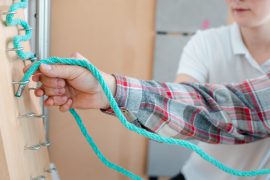From 1-4 pm on Thursday 27th October, during the University of Sydney’s Innovation Week, the Education Portfolio is hosting a three-part Teaching Colloquium about ‘Experiments in Learning and Teaching’ where colleagues from around the University will share some of their innovative teaching practices. Find out more and sign up here.
1-2 pm: Learning and Teaching Online

Hear about the experiences of colleagues working in Massively Open Online Courses (MOOCs), and how this has impacted their perspectives of learning and teaching both in blended and online situations.
Katherine Olston from the Centre of English Teaching (CET) will talk about the development of the ‘Academic Skills for University Success’ course and her experiences teaching on it. This specialisation aims to assist students to prepare for university study in English-speaking universities.
More information on this course and enrolment details are available on Coursera.
James Humberstone from the Sydney Conservatorium of Music will talk about teaching on ‘The Place of Music in 21st Century Education’. This course was the University’s first MOOC and has been running since March 2016. The course describes how innovative approaches to education can extend traditional ones to develop truly student centred learning.
More information on this course and enrolment details are available on Coursera.
Register for Learning and Teaching Online2-3 pm: Renewable Assessments

Designing assessments which are authentic and valued by students is hard work. Similarly, developing resources which are engaging and student-centred takes time. Hear about how colleagues design and implement assessments where students generate resources that can then be used for teaching or even research. Students value these assessments because they produce something meaningful, real and useful. Is there better way to learn a subject than to try to teach or test someone else on it?
Dale Hancock from the School of Life and Environmental Sciences will talk about the implementation and results of her highly successful 2015 Educational Innovation Grant ‘Achieving engagement with struggling students by getting them to write the exam!’. Through this project, students have been writing, sharing and evaluating multiple choice questions in a first year microbiology and genetics unit. These questions become invaluable formative assessment resources as well as potential items in the final exam. The activity of writing and critiquing questions also helps students get to grips with the material during semester.
Joe Lizier from the School of Civil Engineering will talk about “Encouraging Pre-Reading Using Student Generated Videos“. He encourages preparation for lectures by asking students to generate pre-lecture videos based on the pre-readings. Students need to integrate ideas from other sources and creativity is encouraged. In a recent Teaching@Sydney blog post, he explains that “It delivers more learning resources and a wider variety of content for the students – the suite of videos provide a quick mechanism to minimally get across all of the readings, and to invite them to engage further.”.
Alice Williamson from the School of Chemistry is part of a world-wide open source drug discovery research program aiming to quicker and cheaper therapies. In 2015 and 2016, she has extended this project into first year chemistry where students make potential drug precursors which are then tested for anti-malaria activity. As well as becoming part of a world-wide research initiative with enormous potential to positively affect lives, the students also report by making their own videos which are assessed through a ‘short film festival’.
Register for Renewable Assessments3-4 pm: Developing Graduate Qualities in Health Professionals

Health researchers and practitioners need to work across large, interdisciplinary teams and contexts in order to deliver the best possible care. Hear how academics are working to develop graduate and inter-professional qualities through a range of innovative and authentic activities and assessments.
Annette Burgess from the Education Office in the Sydney Medical School will talk about ‘A new inter-professional Peer Teacher Training program for health professional students‘. On entering the workforce, and throughout their careers, health professional graduates are expected to teach, assess, supervise and provide feedback to colleagues across health disciplines. However, these skills are rarely taught at university. In 2016, following receipt of a Large Educational Innovation Grant, a new inter-professional Peer Teacher Training (PTT) program was developed with an inter-professional team from across three faculties (Medicine, Health Sciences and Pharmacy). The PTT program is specifically designed to provide health professional students with opportunities to develop their skills in teaching, assessment and feedback, and prepare them for peer assisted learning activities, and future health professional practice. Delivered as a six module program, participants are provided with theoretical background and opportunities for active participation in small group inter-professional learning teams. The program uses a blended mode of delivery, comprising of one online module, followed by a one day face-to-face session. Throughout 2016, senior students were invited to take part in the PTT program. This presentation will consider the strengths of the program, and needs for improvement.
Project team members for the PTT program include Annette Burgess, Craig Mellis, Gillian Nisbet, Tim Chen, Chris Roberts and Kirsten Black.
Gillian Nisbet from the Faculty of Health Sciences and Chris Roberts from the Sydney Medical School will present their ‘Team video assessment for large scale student-directed interprofessional learning’. The ability to work collaboratively with other professions is essential for delivering safe, effective and high quality team-based health care. Despite being an accreditation requirement of health curricula, universities struggle to create and sustain authentic interprofessional learning activity (IPL) that accommodates large student cohorts and provides meaningful assessment of interprofessional competencies. The Health Collaboration Challenge (HCC) is the largest health student IPL activity in the Southern Hemisphere. In 2016, over 1600 students participated in the HCC as a mandatory assessed component of their degree program. This was achieved through use of an innovative student-directed team video assessment task, peer marking, and a mechanism for providing peer feedback on teamwork behaviours. This presentation will share outcomes of the project and explore potential transferability of the HCC model to non-health disciplines.
The health care challenge is another successful outcome of Educational Innovation Grant funding and brings together teams of students and academics from across the health disciplines to attempt to solve real-world health issues. The HCC project team members are Jacqueline Bloomfield, Timothy Chen, Kimberly Coulton, Stacey Gentilcore, Christopher Gordon, Inam Haq, Christine Jorm, Elizabeth Martin, Gillian Nisbet, Chris Roberts and Wendy Stuart-Smith.
Paul McGreevy and Vicky Tzioumis from the Faculty of Veterinary Science are part of a national Office of Learning and Teaching funded project to develop teaching resources for the teaching of ethical issues. In this talk they will discuss how to use the tool ‘Chatterbox’ which was developed through this project. Chatterbox is an online version of the ‘Human Continuum’, an established cooperative/cognitive learning strategy which requires students to respond to an ethical question (e.g. is it right to feed seagulls) by identifying and committing to a position along a virtual continuum, listening to alternative positions and reconsidering their view in response. The virtual continuum can be focused around any issue and in this workshop, you are invited to explore how it can be used to discuss ethical issues across the health professions.
Register for Developing Graduate Qualities in Health Professionals





